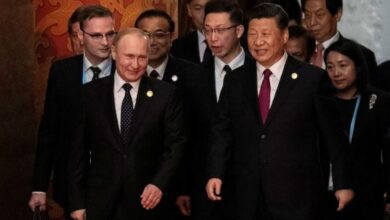Trudeau is coming for Canadians’ guns. Some provinces refuse to help.

Canadian Prime Minister Justin Trudeau announces gun-control legislation in Ottawa on May 30. (Patrick Doyle/AP)
TORONTO — After a gunman rampaged across rural Nova Scotia in 2020, killing 22 people in Canada’s worst mass killing, Prime Minister Justin Trudeau banned some 1,500 makes and models of “military-grade” assault-style firearms and pledged to buy them back from owners.
Are you on Telegram? Subscribe to our channel for the latest updates on Russia’s war in Ukraine.
Now, as Canada’s Liberal government prepares to launch the first phase of the mandatory buyback, several provinces and territories say they won’t help.
The most strident opponents, including the United Conservative Party government in Alberta, are suggesting the Royal Canadian Mounted Police “refuse to participate.” Tyler Shandro, the province’s justice minister, declared the buyback was not “an objective, priority or goal” of the province or its Mounties. Alberta, he said, is “not legally obligated to provide resources for it.”
Marco Mendicino, Canada’s public safety minister, has cast Alberta’s “reckless” position as a “political stunt.” But Saskatchewan, Manitoba and New Brunswick have also balked at using “scarce RCMP resources” for the program.
“New Brunswick’s bottom line is this: RCMP resources are spread thin as it is,” said Kris Austin, the province’s public safety minister. “We have made it clear to the government of Canada that we cannot condone any use of those limited resources, at all, in their planned buyback program.”
New Zealand is trying to buy back the military-style weapons it banned in April. It’s not so easy.
The dispute is one of several that’s inflaming tensions between Ottawa and the provinces. Alberta and Saskatchewan, long estranged from the capital, recently introduced bills to seek greater “sovereignty” for their provinces and to fight what they see as federal “intrusion.”
Opponents of gun restrictions protest at Parliament Hill in Ottawa on Sept. 12, 2020. (Justin Tang/AP)
Most provinces and territories contacted by The Washington Post, including those that support the gun buyback, said they were waiting for more details on what will be required of them. Prince Edward Island did not respond to a request for comment.
Yukon’s government said it supports Trudeau’s gun-control proposals and is committed to finding a balance between counteracting the adverse impacts of illegal firearms and respecting hunting rights. But Tracy-Anne McPhee, the territory’s justice minister, has told Mendicino that its RCMP lacks the “administrative, personnel or the financial resources” to participate without additional support, a spokeswoman said.
Mendicino told The Post that he “will always keep an open door to listening to the needs of my provincial and territorial counterparts when it comes to policing and resources.”
Canada vows to ‘freeze’ handgun sales, buy back assault-style weapons
Trudeau’s government is attempting to tighten gun laws further this year with a bill to “freeze” the buying, selling and importation of handguns, to stiffen penalties for gun smuggling and to introduce “red flag” laws that would allow judges to temporarily remove firearms from people deemed a harm to themselves or others.
Parliament is studying the legislation. An amendment that proposes a durable definition for a prohibited firearm so that manufacturers can’t get around the ban by modifying gun designs has drawn criticism from several provinces who say it would prohibit some hunting rifles. The government denies the interpretation.
Few details about how the buyback will work have been released. Depending on the make and model of the gun, owners could be compensated from between $1,000 and $2,100, according to a proposed price list. The government says most of the newly banned firearms are in Ontario, British Columbia and Alberta.
Mendicino told The Post that he hopes to launch the first phase of the program — buying back inventory from gun vendors — by the end of the year. The next phase, focused on private gun owners, will start next year. An amnesty to the ban is in place until October 2023 to give owners time to comply.
The government estimates that there are approximately 150,000 registered firearms in Canada that would be bought back. Mendicino said the amendment being debated by lawmakers could “have some impact on the scope of the program.”
The RCMP is a federal police force, but it also provides provincial and territorial policing in much of Canada. Under agreements for “contract policing,” the federal government is on the hook for 30 percent of RCMP costs.
Royal Canadian Mounted Police officers march in Richmond, British Columbia, on Nov. 2 during the regimental funeral of a constable killed in the line of duty. (Darryl Dyck/AP)
“Alberta taxpayers pay over $750 dollars per year to fund the RCMP as our provincial police service,” Shandro, the Alberta justice minister, wrote in September to Curtis Zablocki, the head of the Alberta RCMP. “We expect that those dollars not be wasted to pay for a confiscation program that will not increase public safety.”
Alberta has long been a center of opposition to gun restrictions. It led a challenge to a 1995 law that required owners of certain guns to register them. In 2000, Canada’s Supreme Court upheld the law and said regulating firearms is a valid exercise of federal power over criminal law.
Premier Danielle Smith won leadership of Alberta’s United Conservative Party by vowing more “sovereignty” for the province, including by creating its own police force. She introduced a bill this week that would allow ministers to direct provincial entities, including the RCMP, to ignore federal laws that they deem “harmful” to Alberta’s interests.
The government cited the buyback program as an area where that prerogative could be applied. The bill has drawn criticism from legal analysts, opposition lawmakers, Indigenous leaders and members of the business community, who have panned it as a potentially unconstitutional attack on the division of powers between Canada’s federal and provincial authorities, among other problems.
Saskatchewan introduced a bill last month to “clearly confirm” the province’s “sovereign autonomy.”
How countries around the world have responded to mass shootings
Opposition to the buyback is “about the sovereignty act and about replacing the RCMP in Alberta,” said Duane Bratt, a political scientist at Mount Royal University in Calgary. “And, of course, Saskatchewan is feeling the same way.”
Whether it’s legal is another question. Carissima Mathen, a professor of constitutional law at the University of Ottawa, said provinces and territories have some power to set the priorities of the Mounties within their borders, but they “can’t direct the RCMP not to enforce a valid federal policy or law.”
In Shandro’s letter, Mathen said, the Albertan official tries to “make the argument that the RCMP can’t be required to perform duties or provide services that are inappropriate to the effective and efficient delivery of police services. I think trying to make the argument that managing a gun buyback program is actually somehow undermining of their police duties is a remarkable thing to say.”
Members of an RCMP tactical unit confer after Gabriel Wortman, the gunman in a deadly shooting rampage that left 22 dead, was killed at a service area near Elmsdale, Nova Scotia, on April 19, 2020. (Tim Krochak/AFP/Getty Images)
Shandro has said he’s challenging the program through a dispute settlement system in the province’s contract with the RCMP. Ethan Lecavalier-Kidney, his spokesman, said it would make no difference if the federal government offered more resources.
“Regardless of what resources are used, Alberta’s government does not support the confiscation of legally acquired firearms from Albertans,” he said.
The RCMP referred questions to Public Safety Canada.
“Alberta’s position on this misconstrues the purpose of the buyback program,” Mendicino said. “The buyback program is entirely compatible, and advancing of, provincial public safety priorities because it seeks to take assault-style rifles out of our communities once and for all.”
Mass killings in Canada are relatively rare, compared with in the United States. The Washington Post in 2022 began defining a mass killing as an event in which four or more people, not including the shooter, have been killed by gunfire.
In 2021, police here reported the highest homicide rate since similar data was first collected in 2005. Guns were the most common weapon used, according to Statistics Canada. There are gaps in the data, including on whether the guns were possessed legally.
Gun control has broad support here, particularly in urban areas. Critics charge that limiting gun ownership unfairly targets law-abiding gun owners while doing little to address guns smuggled illegally.
Evan Bray, the police chief in Regina, Saskatchewan, told a parliamentary committee last month that the proposed firearms legislation will “improve public safety.” But the “real issue,” he said, is illegal guns from the United States that have contributed to a “disturbing” trend in gun violence, mostly tied to gangs.
Bray, who co-chairs a Canadian Association of Chiefs of Police firearms group, said he understands concerns about resources. The “importance,” he said, “is in the details of how this will be rolled out.”
735Comments




